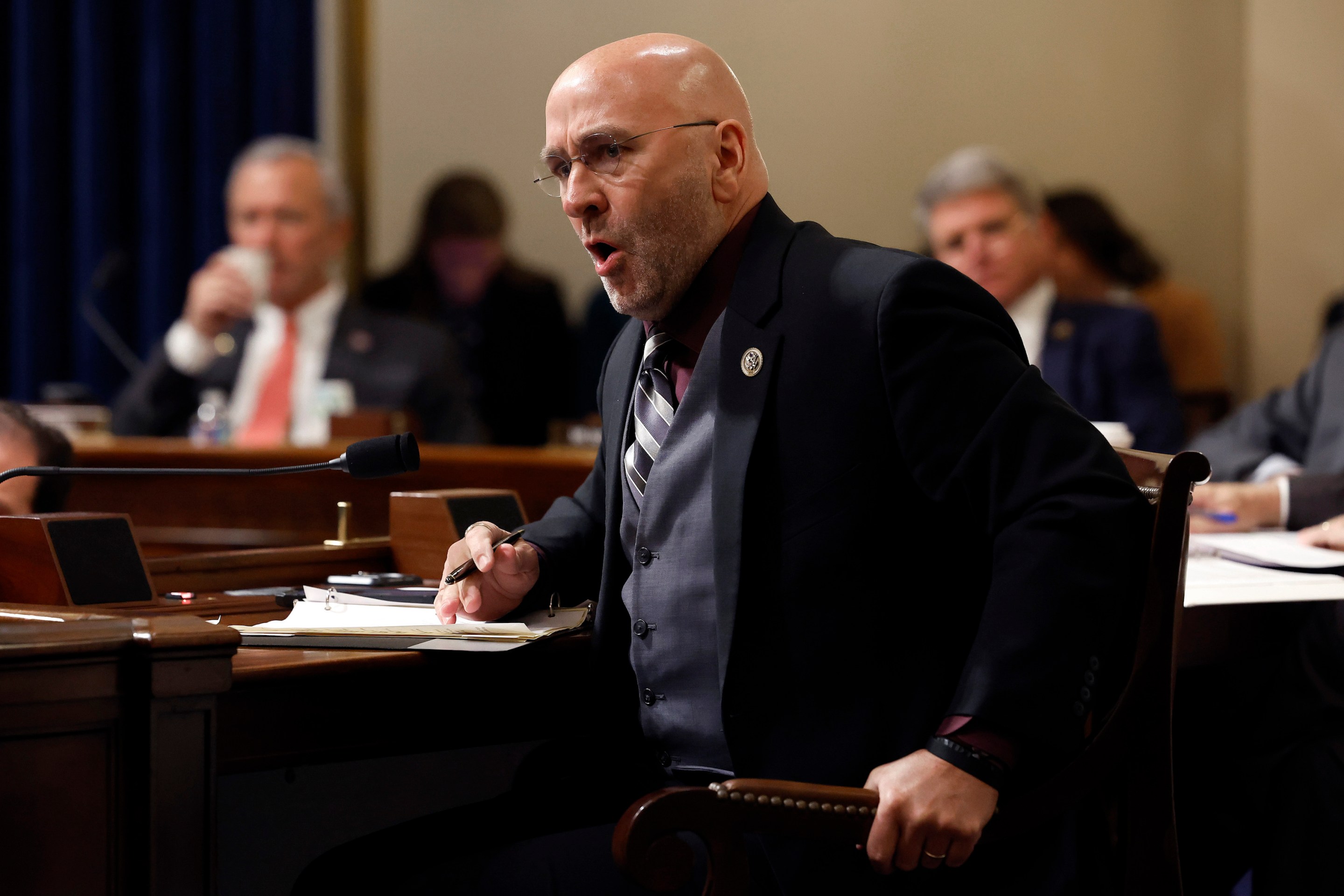"About an hour’s drive from Baton Rouge, La., in the historic heart of Cajun country, a beacon of justice has risen from the murky swamps to bring order and civility to the land," Peter Holley wrote in The Washington Post in May of 2015. "A muscled Army veteran and hardened street cop who rarely cracks a smile, Higgins may be the most irresistibly intimidating man in America." Clay Higgins, who is now in his fourth term in the House of Representatives, had not yet completed the career progression that has seen him go from Louisiana National Guard MP to car salesman to police officer to Police Officer Who Goes On TV A Lot to congressman, and finally to the sort of conservative microcelebrity who posts about insurrection on social media in the fake-o pidgin military-ese familiar from Q drops. The first part is a natural progression in a warped and abstracted political culture; the last bit is more about gravity.
Holley's story, which is headlined "Meet The ‘Cajun John Wayne,’ The Deputy Whose Meme-Worthy Videos Terrify Criminals" is a strange hybrid. It reads as a colorful news-of-the-weird story devoted to Higgins's local popularity on Facebook and as the star of a Crime Stoppers segment on local news, but reaches for something more than "check out this unsettlingly self-assured celebrity cop." It is written in the sort of arch language that newspapers and magazines use to signal that they are writing about someone they don't quite take seriously, but as those stories nevertheless run in those outlets it's tough to say what that means. In the article, Facebook commenters and Higgins's co-workers at KATC Channel 3 alike marvel at what a remarkable man he is, so hard and yet also so empathetic; Holley relates the story of a local fugitive who turned himself in on an assault charge after watching a Higgins segment encouraging him to do just that. (When CBS This Morning did a segment on Higgins in September of that year, correspondent David Begnaud put that number at nine in 2015 alone. In that segment, which begins with Creedence Clearwater Revival's "Born On The Bayou," Higgins also mentions that he is not even a little bit Cajun.)
Read today, the story feels uncanny, unconvincing, and also somehow inevitable. A subject who is both obviously inhabiting a stilted character and powerfully prone to making shit up is quoted as if the faintly get-a-load-of-this-guy tone of the writing sufficiently qualified those quotes. Holley mentions that Higgins took time off from pursuing a murder suspect to talk to the Post; he tells the story of Higgins throwing out the first Crime Stoppers script he was handed and listening "to his gut, drawing on 17 years of law enforcement experience" before cutting the epic promo that built his brand online and in his community.
There is no mention of Higgins having designs on a congressional seat, but you can see how that might be a next step even without the benefit of hindsight. "People don’t want to hear political crap," he told Holley of his monologues, which were delivered armed, in uniform, and directly into the camera, and often from locations having to do with whatever it was that he was holding forth about—in front of a World War II memorial for a segment about a Romanian scammer who was getting over on elderly locals, for instance. When Higgins resigned his post with the St. Landry Sheriff's Department rather than follow his boss's request to tone it down, he did so in a press conference on the steps of the Parish courthouse in February of 2016. The Post covered that, too.
Higgins won his election a few months later against a well-known state Republican eminence despite being outspent four-to-one. His campaign spun the result as a triumphant integration of old-time retail politics and online savvy, although Higgins also benefitted from legacy spats within the party and the assistance of a PAC that used Cambridge Analytica, the shady data-scraping concern that got in trouble for illegally accessing and selling the data of 87 million Facebook users. The combination of old-fashioned reactionary populism and newfangled political media practices, played right up to the line by a candidate who was mostly famous for behaving in a severely overstated way on television, mirrors Trump's own ascent so cleanly that it almost makes the otherwise inexplicable decision to devote this much national coverage to a blustering, publicity-seeking local cop seem justifiable after the fact.
At any rate, it's recognizable. So, in retrospect, are the assurances that Higgins would focus on doing his job once he'd finished doing everything he needed to do to get it. "He’s going to be a lot less bombastic," a Higgins advisor told the Acadiana Advocate in 2016. "Clay is serious about being a thoughtful servant for the 3rd District." Also recognizable is the Post's coverage of the criticism Higgins received in 2017 when, this time as a member of Congress, he hopped on Facebook after a terror attack in London and wrote that "The free world … all of Christendom … is at war with Islamic horror," adding that "not a single radicalized Islamic suspect should be granted any measure of quarter... Hunt them, identify them, and kill them. Kill them all. For the sake of all that is good and righteous. Kill them all."
"Where some saw hate speech," the Post wrote, "others saw an unvarnished version of the truth." It's either a bold declaration of the lurid conservative parallel version of reality, or a call for extralegal bloodshed. It's notably polite on the part of the media that discusses this stuff to pretend that binary still has two sides.
If you go by the understanding of political best practices that runs through the early coverage of Higgins, it would seem like he has continued to make the same mistake again and again as a member of Congress. What Higgins has reliably done—putting up posts that violate Facebook's terms of service by being just a little too overtly murderous, say, or posting and then retracting a five-minute video that he recorded while wandering around Auschwitz in which he mused that the horrors of the death camp reminded him "that homeland security must be squared way," or tweeting that "this Chris Christie guy is quite an ugly woman"—was by those lights a distraction from the work that Higgins should otherwise have been doing, instead of just him doing it. But a lens that draws a distinction between those two things may not have much use at this particular political moment.
Higgins is not the first elected official to serve according to influencer-style incentives above all else, and he is also probably not the most purely affective member of Congress; poster-brain casualties exist in both parties, and if the reactionary expression of that damage is necessarily a little more deranged and bloodthirsty, it follows from the same rote "Yes, and" imperatives that guide national politics at its most abject and abstracted edges. None of the sketchy stuff that Higgins has been caught out doing, from telling the most recent of his ex-wives that he needed to win election to the House in order to pay the six figures of child support that he owed, to putting a fellow ex-cop who lied on Higgins's behalf to internal affairs about an excessive-force case back in 2007 onto his congressional office's payroll, is the sort of thing that will get Higgins in any kind of serious trouble. This is not just because of how Republican his district is, and it's not even because the idea of "getting in any kind of serious trouble" effectively no longer exists in American politics. If you expect actual public service from a public servant, that sort of stuff seems bad. If you expect content and color and performance, it looks different.
Given the way that GOP politics works right now, the only candidate who could challenge Higgins in a district like his would be one trying to act even more like Clay Higgins. It is difficult and unpleasant to imagine what that would even look like. More than that, though, Higgins inhabits the Trumpian space in which the uncanniness and theatricality of his presentation—here he is decrying vaccination mandates while dressed like Christopher Lloyd's character in Who Framed Roger Rabbit?—works to obscure how common these kinds of violent retributive fantasies and operatically conspiratorial self-justification have become within conservative politics.
Higgins is not going to introduce or pass any legislation, but he still does his job. The gig, to the extent that it imposes any demands upon Higgins beyond continuing to be his peacocking self, is to push forward in search of the most extreme and overt expression of an increasingly authoritarian and warlike party line, and then to issue qualifications or clarifications as needed when those words or actions tip unacceptably toward or into actual insurrection.
Here is what that work looked like on Sunday, when Higgins's office issued a statement that both expanded upon and responded to some overwrought tweets about Donald Trump's indictment and the criticism those tweets received.
My fellow conservatives, the DOJ/FBI doesn’t expect to imprison Trump, they expect to imprison you. They want J6 again, in Miami and in your city and in mine. They want MAGA conservatives to react to this perimeter probe and in doing so, set yourselves up for targeted persecution and further entrapment. They want to intercept a busload of conservatives en route to protest and create conflicts during the stop. They are hoping to provoke conservative Americans. Don’t fall for the trap. Maintain your family. Live your life. Live free and pay close attention and make your voice heard, yes… but don’t become an incarcerated pawn in the agenda driven DOJ/FBI strategy to oppress conservatives across America.
If this is confusing—and it is very confusing, a mix of contemporary conspiratorial conjecture and the wrestling-promo blood-and-thunder that Higgins brought to his old local news segments—it is mostly because of the conflict between the message's ultra-fervid tone and the attempt to send a less overtly insurrectionary message. The post-indictment tweets that Higgins was kinda-sorta walking back, on the other hand, demonstrate what it looks like when he is fully in character.
President Trump said he has "been summoned to appear at the Federal Courthouse in Miami on Tuesday, at 3 PM."
— Rep. Clay Higgins (@RepClayHiggins) June 9, 2023
This is a perimeter probe from the oppressors. Hold. rPOTUS has this.
Buckle up. 1/50K know your bridges. Rock steady calm. That is all.
Patriots, we’ve manipulated the MSM to establish deep commo, now copy this… do NOT trip the wire they’ve laid for you. Maintain your family. Live your life. Know your bridges. Hold.
— Rep. Clay Higgins (@RepClayHiggins) June 10, 2023
Let Trump handle Trump, he’s got this. We use the Constitution as our only weapon. Peace. Hold.
It is worth wondering, here and in general, what the fuck Higgins is even on about, but it is less difficult to see what he is going for; that he's so incoherent and so mannered doesn't make this stuff difficult to parse. It's a fantasy of war and impunity, both individuated (these are messages from a commander) and communal. It's the downstream efflorescence of an extremely robust self-regard and capacity for self-invention, both on his part and that of his movement; it's the tone of a military police handbook skimmed decades ago, filtered through all the ambitions and incentives of a reactionary politics that long ago yielded to its most brutal fantasies, re-arriving years later in the form of posts written by a character who sees himself as If Jack Reacher Was In Metal Gear Solid. It's absurd, of course, but there's no longer any meaningful sense in which it's abnormal.





